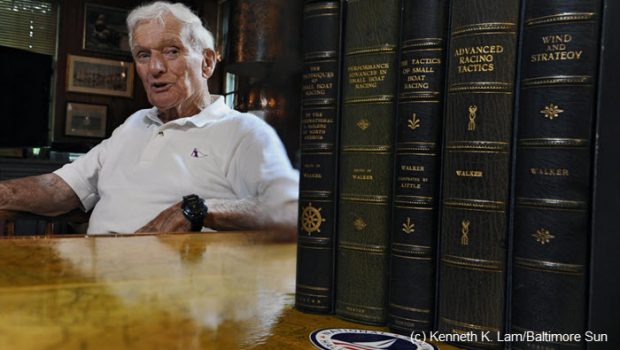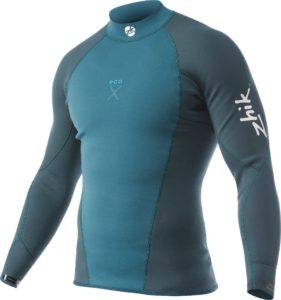Eight Bells: Stuart Walker

Dr. Stuart Walker, one of the world’s most renowned dinghy sailors and founder of Severn Sailing Association, died on November 13 at the age of 95 in Annapolis, MD.
Dr. Walker, who died as a result of stomach cancer, participated in his last competitive regatta this past April when he finished 10th out of 12 entries at the Soling United States National Championship that was hosted by Severn Sailing Association.
Walker was the guest of honor at an August party held at Severn Sailing Association in anticipation of his death. In an email to family, friends and fellow SSA members, he explained the purpose of the party.
“Many years ago I decided that when I died a great party should be given at SSA in remembrance of me,” Walker wrote. “Recently, however, when I was informed that my abdomen was filled with cancer, I decided that it would be far more fun for me to hold the party in advance of my demise.”
Walker’s last book, titled “Severn Sailing Association – The First Ten Years” was completed and printed in time for the August 26 party.
“Dr. Walker was a remarkable man and he led a remarkable life–a success in so many ways both in his vocation as a pediatrician and in his primary avocation as a small-boat racing sailor,” current Severn Sailing Association commodore Jonathan Phillips said.
“Stuart was a world-class sailor who experienced great success in numerous classes at the national and international level. I know it’s a cliche, but he really was a larger-than-life figure at SSA and in the greater sailing community and his love and passion for the sport inspired many others.”
Walker was enshrined in the National Sailing Hall of Fame in 2013 and it was rather fitting the induction ceremony was held in his hometown. He was 90 years old at the time and gave a rousing speech to a large audience at City Dock.
Gary Jobson, current president of the National Sailing Hall of Fame and another legendary Annapolis sailor, paid tribute to Dr. Walker upon learning of his death.
“Stuart Walker was an enthusiastic sailor who wrote about it his entire career,” Jobson said. “Stuart just loved being on the water and sailed regularly until he could no longer do so. The sport of sailing has lost a great one with the passing of Stuart Walker.”
LONG LIST OF ACCOMPLISHMENTS
Walker’s list of accomplishments is impressive and includes representing the United States in sailing at the 1968 Olympic Games, capturing a gold medal at the 1979 Pan American Games, becoming the first American to win both the Prince of Wales Trophy (England, 1964) and the Princess Elizabeth Trophy (Bermuda, 1963) and founding the Severn Sailing Association.
“I think the thing I’m most proud of is creating the Severn Sailing Association, which remains one of the premier small-boat racing clubs in this country,” Walker said prior to his induction into the National Sailing Hall of Fame.
“I take great satisfaction from seeing that, after all these years, SSA remains true to its original mission. It is still a small boat sailing club, which is what we intended when we created it,” Walker added. “We didn’t want a bar or tennis courts. From the beginning, the purpose was pure sailboat racing and the club was for storing and launching the various fleets.”
Supporters purchased the plot for $45,000 in 1957 and Severn Sailing Association was born with Walker serving as commodore for the first five years. From the outset, SSA was dedicated to the promotion of one-design racing and development of youth sailors.
North Sails professional Jonathan Bartlett is the grandson of one of the three original incorporators of Severn Sailing Association. Richard C. Bartlett joined John J. Hopkins and Robert F. Podlich and in founding the dinghy club located on First Street in Eastport. They spearheaded the purchase of the plot for $45,000 in 1957 and Severn Sailing Association was born with Walker serving as commodore for the first five years of its existence.
Jonathan Bartlett first met Walker at the age of five and later served as the head junior program instructor at Severn Sailing Association. He is currently vice commodore of the Annapolis Yacht Club.
“When Dr. Walker led the charge to acquire the property at Sycamore Point to serve as home of Severn Sailing Association he shaped the landscape of one-design and junior sailing in Annapolis Harbor for the next 50 years,” Bartlett said. “Thousands of kids benefited with learning to sail in a fantastic location myself included.”
Just as notable are Walker’s vast contributions as a sailing author, instructor and lecturer. A keen student of the sport, Walker wrote 12 books on sailboat racing that have focused on technical topics such as trimming or boat positioning, meteorological issues such as low-level wind flow or psychological aspects such as competitive behavior and the art of winning.
“Certainly my name has spread through my writing, but my articles would not have credibility if there wasn’t success behind it,” Walker told The Capital during a party to celebrate his 90th birthday. “My reputation as a fine sailor has provided the platform to express my opinion on various topics about our sport.”
For a period of four decades, Walker contributed a monthly column to the publication currently called Sailing World Magazine. He has written extensively for the renowned English magazine Yachts and Yachting.
“I think the great thing about Stuart Walker has been his willingness to share his vast sailing experience with the broader public,” Jobson once told The Capital. “Stuart is an Olympian and a champion. Many young people have benefited from his dedication, helpful writings and example.”
A native of Hartsdale, N.Y., Walker was introduced to sailing at the age of 12 when his father bought a 50-foot Class Q sloop and delivered it from Boston to Larchmont.
“We were true novices who learned an amazing amount about sailing on that one trip and I would spend five years of my teenage life in front of the mast of my father’s boat,” Walker told The Capital.
Walker established the intercollegiate sailing team at Middlebury College in Vermont and the school recently named its signature home regatta in his honor. Upon entering medical school at New York University, Walker purchased a Star class boat and competed out of Larchmont Yacht Club — thus beginning a lifelong love affair with dinghy racing.
Upon joining the United States Army and being sent to Japan with a paratrooper division, Walker built a Penguin so that he could continue to sail while overseas. He specifically asked to be assigned to an East Coast base that was near a major body of water and was thrilled when the Army sent him to Fort Meade.
“I soon discovered what a lovely place Annapolis was and decided this is where I wanted to live. So I left the Army and started my own pediatric practice,” said Walker, who resided in Annapolis from 1953 until his death.
Walker gave up that private practice in Annapolis specifically so he could have more time for sailing. He served as Chief of Pediatrics at Mercy Hospital in Baltimore for a stretch then began teaching at the University of Maryland School of Medicine in 1961.
COMPETITIVE SUCCESS
It was around that time when Walker grew more serious about sailboat racing and became a force on the International 14 circuit. Walker always considered capturing the Prince of Wales Cup his greatest accomplishment. It was 1964 and to that point only British competitors along with one Australian had been victorious in the prestigious event known as the America’s Cup of dinghy racing.
Walker struggled early in the competition, but spent several days thoroughly researching the venue from a high hill overlooking the race course while acquiring insider knowledge from local watermen.
“It really was a shock to the Brits that an American could show up and win an event that they truly dominated,” said Walker, who was a member of every American team for international matches in the I-14 class from 1961 through 1971.
A few years later, Walker accepted an invitation to serve as trimmer and tactician for Philadelphia skipper Gardner Cox as he mounted an Olympic campaign in the 5.5 class. It was considered quite an upset when Cox, Walker and Steve Colgate knocked off such legends as Lowell North and John Marshall to win the U.S. Trials off Newport Beach, Cal.
While the sailing competition was held off Acapulco, the 1968 Summer Olympics were hosted by Mexico City. Walker told The Capital that entering the main Olympic stadium during the opening ceremony and hearing the roar for the United States team was “one of the greatest thrills of my lifetime.”
Walker transitioned from the International 14 to the Soling and won a slew of major events in that one-design keelboat class as well. He has been the premiere Soling sailor at Severn Sailing Association five decades, winning the annual Ice Bowl Regatta 34 out of 60 times from 1955 through 2013.
Walker has captured the Soling National Championship six times (1973, 1983, 1987, 1988, 2003, 2007) and has also enjoyed extensive success overseas in the class. He garnered the Australian Gold Cup in 1982 and has won national championships in such European countries as Hungary, Austria, Switzerland, Scotland, Holland and Bavaria. He served as president of the Soling class from 1991-1994.
Walker, who was inducted into the Anne Arundel County Sports Hall of Fame in 1992, announced he was retiring from competitive sailboat racing due to macular degeneration two years ago.
“It was a difficult decision in advance, but not after I made it. I felt relieved,” Walker told The Capital. “It’s annoying and frustrating to not be able to perform up to your capabilities because you can’t see.”
However, it proved to be only a partial retirement as Walker continued to compete in the annual Soling Ice Bowl and also created the Thomas Point Lighthouse Race that was a similar point-to-point event.
“That’s the type of race I can still do because I know the Severn River so well,” Walker said of the Ice Bowl. “It’s a distance race that does not feature many mark roundings or boat-on-boat action. I’ll sail the Ice Bowl blind if necessary!”
Walker was preceded in death by his wife of 67 years. Francis Walker, who died in September, 2012, was famously fired as crew for her husband because he said she was “too incisive.”
Walker was 90 years old when he married for a second time to longtime Severn Sailing Association member Patricia Empey in the spring of 2013.
(Editor’s Note: This story will be updated with funeral information as soon as an obituary is completed by the family).
Published on November 13th, 2018: by Bill Wagener, Capital Gazette
Story from Scuttlebutt Sailing News










